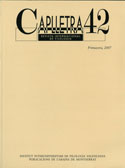La dislocació a la dreta en català i castellà: microvariació en la interfície sintaxi/pragmàtica
DOI:
https://doi.org/10.7203/caplletra.42.4826Paraules clau:
Right-dislocation, Microvariation, Syntax, Pragmatics Resum
Resum
This article investigates the use of right-dislocation in Catalan and Spanish. We have measured the productivity of right-dislocation in a corpus of an original Catalan text and its Spanish translation regarding four variables: category, grammatical function, discourse function, and distance with respect to the antecedent. The analysis shows that right-dislocation is a marginal phenomenon in Spanish, not only from a quantitative (10 occurrences vs. 232 occurrences in the Catalan text), but from a qualitative point of view: right-dislocation in Catalan affects all the categories, grammatical functions, discourse functions, and distances with respect to the antecedent, whereas in Spanish it is restricted to nominals (SD and DEM) and sentences (SC), to subject and object functions, mainly to a the (re)introduction of a topic in the discourse, and to extreme distances (1 and 4). So then, in order to fulfill the tasks covered by right-dislocation in Catalan, Spanish must resort to other mechanisms —
the placement of the dislocate in situ, its omission, or left-dislocation—, which suggests that the difference between these languages has to do with the different discourse management of the same collection of syntactic resources.
 Descàrregues
Descàrregues
Descàrregues
Publicades
Com citar
-
Resum579
-
PDF234
Número
Secció
Llicència
L’autor o autora que adrece un treball a la redacció de Caplletra perquè siga publicat ha de ser la persona titular legítima dels drets d'explotació. La legitimació per a la publicació del treball ha d’incloure també les imatges, les taules, els gràfics i altres materials que puguen complementar el text, amb independència de si n'és l'autor o autora.
Copyright. Quan publica el treball en la revista, l'autor o autora cedeix a Caplletra. Revista Internacional de Filologia els drets d'explotació (reproducció, distribució i comunicació pública), tant per a l'edició impresa en paper com per a la versió electrònica, que serà accessible mitjançant la xarxa Internet.
Tots els treballs publicats en Caplletra es troben sota una llicència Creative Commons del tipus Reconeixement-NoComercial-SenseObraDerivada 4.0.
RESPONSABILITAT
Caplletra. Revista Internacional de Filologia no s'identifica necessàriament amb els punts de vista mantinguts en els treballs que publica.
Caplletra. Revista Internacional de Filologia declina tota responsabilitat derivada de qualsevol vulneració eventual dels drets de propietat intel·lectual que poguera ser duta a terme pels autors o autores.






